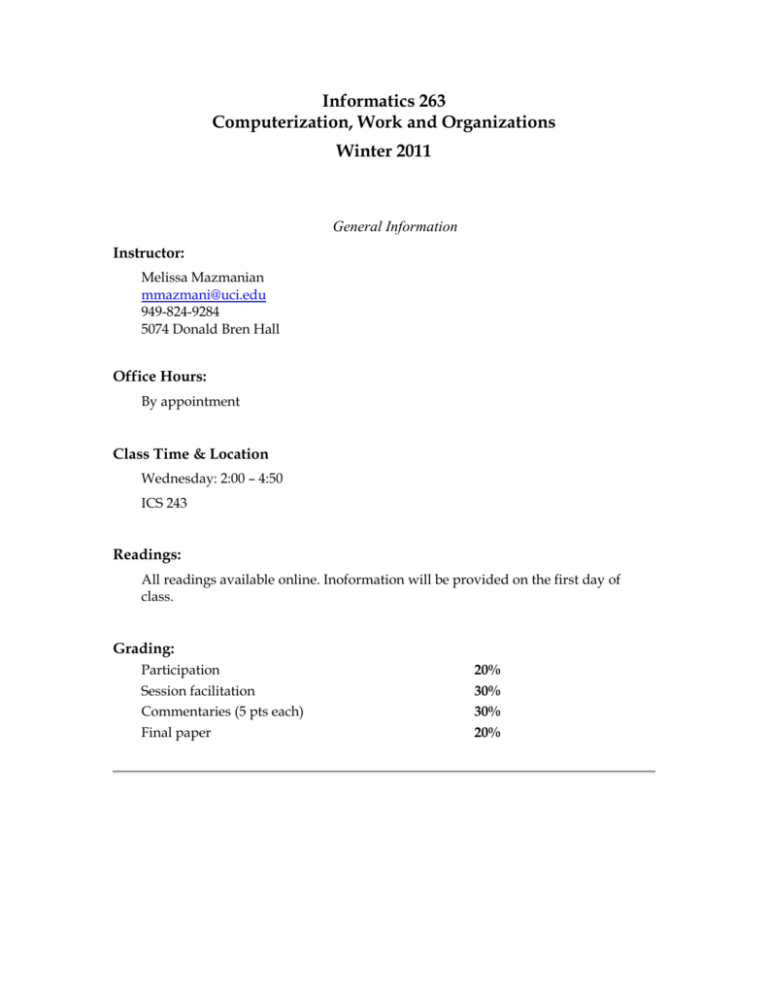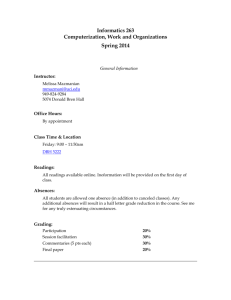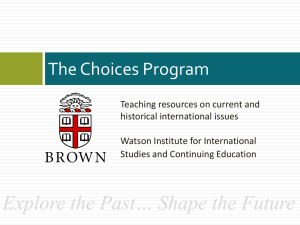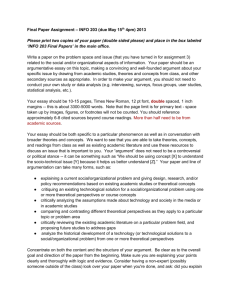ICS 263 SYLLABUS, Winter 2011
advertisement

Informatics 263 Computerization, Work and Organizations Winter 2011 General Information Instructor: Melissa Mazmanian mmazmani@uci.edu 949-824-9284 5074 Donald Bren Hall Office Hours: By appointment Class Time & Location Wednesday: 2:00 – 4:50 ICS 243 Readings: All readings available online. Inoformation will be provided on the first day of class. Grading: Participation 20% Session facilitation 30% Commentaries (5 pts each) 30% Final paper 20% 263: COURSE OVERVIEW This course is intended to generate understanding of the philosophical, theoretical, and empirical foundations of the social study of technology in organizations. The course involves consideration and discussion of the research literature that includes a range of social phenomena surrounding the development, implementation, use, and implications of technology in organizations. A particular focus of the discussions will be an examination of the research assumptions guiding the theoretical ideas and empirical studies conducted in this field. The readings in this course follow a trajectory from readings that will help us understand research assumptions’ underlying studies in technology and organizations, to a variety of theoretical frameworks applied to studies of technology in organizations and empirical examples of research conducted from the perspective of different research methods/assumptions and theoretical perspectives. This course would be useful for graduate students doing sociological and anthropological work in organizations. Even if one’s research focus does not directly focus on technology more and more core organizational processes and routines happen via information technologies. Therefore, developing frameworks to understand the relationship between technological infrastructure and assumptions and organizational processes is important for scholars across disciplinary traditions.1 Structure This is a seminar not a lecture course. It is based entirely on active class interaction. This course is not designed to provide a flood of information. Rather, readings have been selectively chosen to stimulate rich discussion. Students are expected to take the time to read thoroughly and with a critical perspective. Everyone is expected to come to class fully prepared to discuss all readings. In spirit of engendering a dynamic environment students are encouraged to contribute relevant news stories and Internet examples to discussion. Personal reflection and narrative is also encouraged. Class participation grades will be allocated on the basis of both the quality and quantity of contribution. Assignments There are three assignments for this course: Session facilitation, commentaries on readings, and a final reflection paper. Each is explained in full below. Grades will be determined as a culmination of each assignment plus active class participation. A weighted breakdown is provided on the first page of the syllabus. (a) Session facilitation Students are required to lead and facilitate one class session. Approximately 2 students will be assigned to lead each class session (after the first class). This involves activity before, during, and after the class session. Before the class session, please become familiar with all the readings for that 1 This course is a modified version of a course taught by Wanda Orlikowski at MIT Sloan School of Management, 15.576: Research Seminar in Information Technology and Organizations: Social Perspectives. I thank Wanda for her excellent course and permission to modify her existing syllabus. 263: Comp, Work, Orgs 2 Winter, 2011 class and generate key themes and questions for class discussion. I expect students meet with me a few days before the class session to discuss the design of the session and the particular ideas and issues you would like to highlight. During the class session the student will provide a 15-20 minute overview of the important themes and issues raised by the readings, ending with 3 specific questions to discuss. The student is then expected to facilitate a discussion for the remainder of the session. Facilitation includes guiding discussion, eliciting questions, and providing closing summary remarks in the last 5-10 minutes of class. After the class session, you will prepare a short written summary of the themes and issues discussed, and distribute this to the rest of the class at the next session. Grades for facilitating a session depend on level of preparation, framing of overview and closing remarks, written summary, and quality of discussion facilitated. (b) Commentaries Students will prepare six (out of a possible nine) commentaries on class readings. These papers are due at the beginning of class and intended to invoke thoughtful consideration of the materials read (approx 2 pages, 1.5 space). Students are encouraged to explore how themes from a previous week are explored in the current readings, explore how the theoretical perspective has concrete implications in a specific real world scenario, and reflect on how the readings inform their research interests and endeavors. Insight into how the theoretical perspectives presented in the readings might inform how the student understands and interprets data from their individual research, or imagines his or herself conducting research is also encouraged. A summary of the reading, or simple compare and contrast between readings, is not acceptable. Papers will be graded based on evidence of deep reflection and application of the readings. (d) Reflection paper (final) An individual final reflection paper is to be submitted one week after the end of the course (6-8 pages, 1.5 space; due March 16). This paper provides an opportunity for students to reflect on course materials and applications. Students can choose one of three options for their final paper: 1. Write and extended memo applying one or more of the theoretical perspectives discussed in class toward concrete organizational research that the student is currently engaged in. 2. Write a first person reflection paper on the methods and ontological assumptions discussed in class and develop an individual research profile that discusses your ideas about research and how the course content has 263: Comp, Work, Orgs 3 Winter, 2011 influenced your ideas about the process, content, and ontological assumptions undergirding research on technology and organizations 3. This option is for Masters students only. I will come up with an alternate final paper assignment for those not interested in research. The paper will be graded based on evidence of thoughtfulness, personal reflection, and integration of course materials with individual perspectives. 263: Comp, Work, Orgs 4 Winter, 2011 263: COURSE SCHEDULE 1/5 Introduction to course & Research Assumptions in Studying Organizational Phenomena Burrell, G. and Morgan, G. Sociological Paradigms and Organizational Analysis, London: Heinemann, 1979: Chapters 1-3: pp. 1-37. Van Maanen, J. “Style as Theory,” Organization Science, 6, 1: 1995: 132-143. 1/12 Research Assumptions in Studying Technology Markus, M.L. and Robey, D. “Information Technology and Organizational Change: Causal Structure in Theory and Research,” Management Science, 34, 5, 1988: 583-598. Winner, L. “Do Artefacts have Politics?” in The Whale and the Reactor: A Search for Limits in an Age of High Technology. Chicago: University of Chicago Press, 1986: 19-39. Kling, R. “Computerization and Social Transformations,” Science, Technology, & Human Values, 16, 3, 1991: 342-367. Orlikowski, W.J. and Iacono, C.S. “Desperately Seeking the ‘IT’ in IT Research: A Call to Theorizing the IT Artifact,” Information Systems Research, 12, 2, 2001: 121-134. THEORETICAL PERSPECTIVES 1/19 Critical/Power Perspectives on Technology Gasser, L. “The Integration of Computing and Routine Work,” ACM Transactions on Office Information Systems, 4, 3, 1986: 205-225. Zuboff, S. “Automate/Informate: The Two Faces of Intelligent Technology.” Organizational Dynamics, 14, 2, 1985: 5-18. Barley, S.R. “Technology, Power, and The Social Organization of Work,” Research in the Sociology of Organizations, 6, 1988: 33-80. Hoskin, K.W., Macve, R. H. “Accounting an the Examination: A Genealogy of Disciplinary Power.” Accounting, Organizations and Society, 11, 2, 1986 105-136 1/26 Constructivist Perspectives on Technology Pinch, T.J. and Bijker, W.E. “The Social Construction of Facts and Artefacts: Or How the Sociology of Science and the Sociology of Technology Might Benefit Each Other,” Social Studies of Science, 14, 3, 1984: 399-441. Woolgar, S. and Grint, K. “Computers and the Transformation of Social Analysis,” Science, Technology, & Human Values, 16, 3, 1991: 368-381. 263: Comp, Work, Orgs 5 Winter, 2011 Garud, R. and Rappa, M.A. “A Socio-Cognitive Model of Technology Evolution: The Case of Cochlear Implants,” Organization Science, 5, 3, 1994: 344-362. Hans K. Klein, H.K. and Kleinman, D.L. “The Social Construction of Technology: Structural Considerations,” Science, Technology, & Human Values, 27, 1, 2002: 28-52. 2/2 Structurational Perspectives on Technology Barley, S. “Technology as an Occasion for Structuring: Evidence from Observation of CT Scanners and the Social Order of Radiology Departments,” Administrative Science Quarterly, 31, 1986: 78108. Orlikowski, W.J. “The Duality of Technology: Rethinking the Concept of Technology in Organizations,” Organization Science, 3, 3, 1992: 398-427. DeSanctis, G. and Poole, M.S. “Capturing the Complexity in Advanced Technology Use: Adaptive Structuration Theory,” Organization Science, 5, 2, 1994: 121-147. Orlikowski, W.J. ““Using Technology and Constituting Structures: A Practice Lens for Studying Technology in Organizations,” Organization Science, 11, 4, 2000: 404–428. 2/9 Post-Humanist Perspectives on Technology Kaghan, W.N. and Bowker, G.C. “Out of Machine Age?: Complexity, Sociotechnical Systems and Actor Network Theory,” Journal of Engineering and Technology Management, 18, 3, 2001: 253-269. 15.576 5 Fall 2008 Latour, B. “Technology is society made durable,” in A Sociology of monsters: Essays on Power, Technology and Domination, Ed, J. Law, 1993: 103-131. Pickering, A. “The Mangle of Practice: Agency and Emergence in the Sociology of Science,” American Journal of Sociology, 99, 3, 1993: 559-589. Walsham, G. and Sahay, S. “GIS for District-Level Administration in India: Problems and Opportunities,”MIS Quarterly, 23, 1, 1999: 39-65. EMPIRICAL DOMAINS 2/16 Technology and Change Burkhardt, M.E. and Brass, D.J. “Changing Patterns or Patterns of Change: The Effects of a Change in Technology on Social Network Structure and Power,” Administrative Science Quarterly, 35, 1990: 104-127. Orlikowski, W.J. “Improvising Organizational Transformation over Time: A Situated Change Perspective,” Information Systems Research, 7, 1, 1996: 63-92. Barrett, M. and Walsham, G. “Electronic Trading and Work Transformation in the London Insurance Market,” Information Systems Research, 10, 1, 1999: 1-22. 263: Comp, Work, Orgs 6 Winter, 2011 Volkoff, O., Strong, D.M. and Elmes, M.B. “Technological Embeddedness and Organizational Change,”Organization Science, 18, 5, 2007: 832-848 2/23 Technology and the Nature of Work Kraut, R., Koch, S. and Dumais, S. “Computerization, Productivity, and Quality of Employment,” Communications of the ACM, 32, 2, 1989: 220-238. Berg, M. “Of Forms, Containers, and the Electronic Medical Record: Some Tools for a Sociology of the Formal,” Science, Technology & Human Values, 22, 4, 1997: 403-433. Nyberg, D, “Computers, Customer Service Operatives and Cyborgs: Intra-actions in Call Centres.” Organization Studies, 30, 11, 2009: 1181-1199. Beunza, D. and Stark, D, “Tools of the Trade: The Socio-Technology of Arbitrage in a Wall Street Trading Room,” Industrial and Corporate Change, 13, 1, 2004: 369-401. 3/2 Technology and Knowing/Learning Brown, J.S. and Duguid, P. 1991. “Organizational Learning and Communities of Practice: Toward a Unified View of Working, Learning and Innovation,” Organization Science, 2, 1, 1991: 40-57. Bechky, B.A. “Sharing Meaning Across Occupational Communities: The Transformation of Understanding on a Production Floor,” Organization Science, 14, 3, 2003: 312–330. Gusterson, H. “Nuclear futures: anticipatory knowledge, expert judgment, and the lack that cannot be filled,” Science and Public Policy, 35, 8, 2008: 551-560. Schultze, U. “A Confessional Account of an Ethnography about Knowledge Work,” MIS Quarterly, 24, 1,2000: 3-41. SUMMARY & REFLECTION 3/9 Questions, Implications, Moving Forward Deetz, S. “Describing Differences in Approaches to Organization Science: Rethinking Burrell and Morgan and their Legacy,” Organization Science, 7, 2, 1996: 191-207. Weick, K.E. “Drop your Tools: An Allegory for Organizational Studies,” Administrative Science Quarterly, 41, 1996: 301-313. Law, J. and Urry, J. “Enacting the Social,” Economy and Society, 33, 3, 2004: 390-410. Locke, K., Golden-Biddle, K., Feldman, M. “Making Doubt Generative: Rethinking the Role of Doubt in the Research Process,” Organization Science, 19, 6, 2008: 907-918. 3/16 NO CLASS - FINAL PAPERS DUE BY MIDNIGHT 263: Comp, Work, Orgs 7 Winter, 2011






